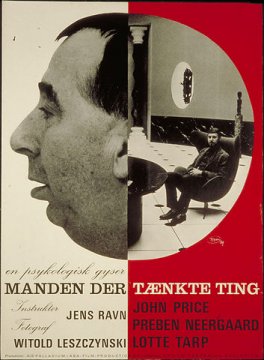 This 1969 science fiction mindbender hails from Denmark, and remains one of the better films of its type (some would have you believe it’s one of the “best” of its type, but I say that’s not the case).
This 1969 science fiction mindbender hails from Denmark, and remains one of the better films of its type (some would have you believe it’s one of the “best” of its type, but I say that’s not the case).
Max Holst, a respected brain surgeon and psychiatrist, is called away from his fiancée’s flat one night to meet an apparent madman named Steinmetz. The latter, who was earlier caught running around asking if people could see a white mouse he was holding, claims to know all about Holst and his work. Upon meeting him in a cell Holst finds that Steinmetz has somehow gotten ahold of a bottle of cognac and a cigar, both of which are forbidden on hospital grounds. Nor does Steinmetz seem at all nonplussed by his confinement, promising to “open up a whole new science” to Holst if only he’ll help him out. Holst laughs off the claim, only to have Steinmetz inexplicably disappear.
Steinmetz later summons Holst to a luxurious mansion. There Steinmetz demonstrates a most impressive set of mental powers that allow him to literally conjure objects out of thin air. He also reveals that he wants Holst to perform brain surgery on him; it seems that thus far he’s been unable to create living beings without those beings vanishing, and he believes brain surgery will fix the problem. Holst, however, refuses to go through with the procedure.
From there Holst’s life grows increasingly fraught. Everyone he knows accuses him of doing things he didn’t do and seeing him in places where he never set foot, leading him to believe that Steinmetz has created a double of Holst who is leading his life. Things really heat up when the double marries Holst’s fiancée and, it seems, permanently upends his existence…
All this is consistently fascinating, albeit notably exposition heavy (meaning viewing an unsubtitled version won’t do non-Danish speakers much good). It would seem that in an effort to overcompensate for their relentlessly dialogue-driven treatment director Jens Ravn and cinematographer Witold Leszczynski offer up a wealth of heavily stylized Stanley Kubrickian visuals, with precisely framed compositions and voyeuristic shots through doorways (and in one case a tiny slit) predominating. It makes for a film that if nothing else is always pleasing to look at.
None of this, however, forgives an ending that, frankly, sucks. Centered on an ironic accident that occurs entirely off-screen, the coda here comes about far too easily, and cheapens an otherwise first-rate exercise in elegantly lensed mind-tugging.
Vital Statistics
THE MAN WHO THOUGHT LIFE (MANDEN DER TAENKTE TING)
ASA Film
Director: Jens Ravn
Screenplay: Henrik Stangerup
(Based on a novel by Valdemar Holst, Jens Ravn)
Cinematography: Witold Leszczynski
Editing: Lars Brydesen
Cast: John Price, Preben Neergaard, Lotte Tarp, Lars Lunøe, Kirsten Rolffes, Ejner Federspiel, Elith Pio, Jørgen Beck, Tove Maës
